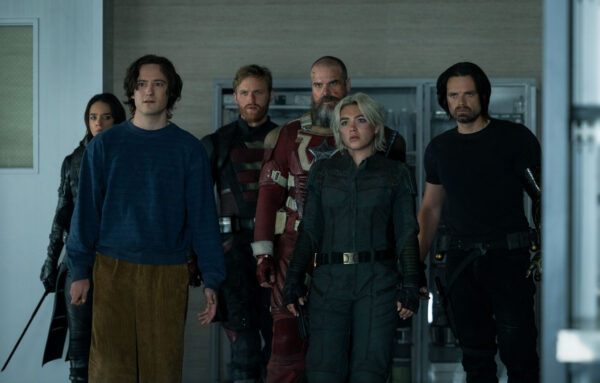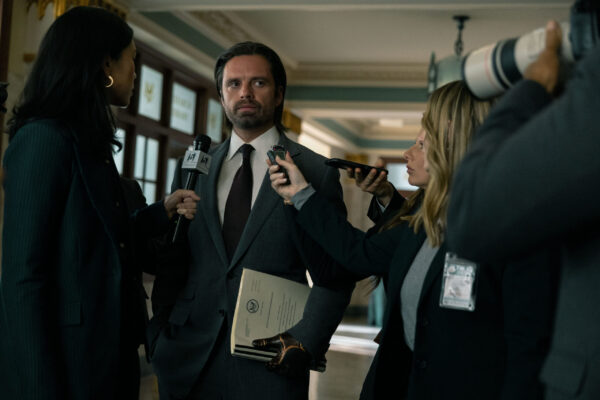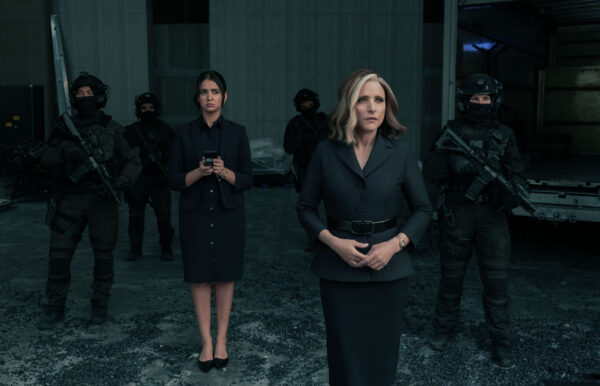
After a few years of (slightly) diminishing returns – in terms of both box office and audience satisfaction – Marvel’s latest entry, Thunderbolts* looks to turn the tide.
Coming on the heels of Captain America: Brave New World, Marvel’s latest film gathers the antagonists (or outright villains) of several previous Marvel films. These include Yelena Belova (Florence Pugh) and her father Alexei (David Harbour) aka Red Guardian, who were last seen in Black Widow along with Taskmaster (Olga Kurylenko); Bucky Barnes (Sebastian Stan) from The Winter Soldier as well as The Falcon and the Winter Soldier television series, which introduced Wyatt Russell’s John Walker; as well as Ghost (Hannah John-Kamen), who appeared in Ant-Man and The Wasp.
The film initially pits all of its self-described “losers” against each other at the behest of CIA director Valentine Allegra de Fontaine (Julia Louis-Dreyfus), who is being impeached and seeking to clean up all of the evidence of wrongdoing, which includes the Thunderbolts.
The first big group action set piece occurs in Valentine’s bunker, set deep underground. It’s a solid way to (re)introduce everyone, including civilian Bob (Lewis Pullman), a new character who is randomly discovered hidden among Valentine’s files. It’s obvious from his introduction that there’s more to Bob than meets the eye, though Thunderbolts* takes its time unpacking the mystery.

Comparisons to DC’s Suicide Squad films are inevitable since they all concern the construction of a team of anti-heroes, but Thunderbolts* is only 50% interested with the idea of a superhero team-up. In unconventional Marvel fashion, large portions of the film are dedicated to the group’s feelings of ambivalence, insecurity, and making amends for past indiscretions.
This is particularly true of Yelena, whose voice-over introduces the film as she executes a clean-up mission in a high-tech lab in Kuala Lumpur. Yelena reveals that she’s been disaffected and empty since the death of her sister Natasha (Scarlett Johansson) in Avengers: Endgame. This also applies (to varying degrees of success) to the other characters, including Yelena’s relationship with her father and Walker’s failures in the domestic sphere.
The one who mirrors Yelena’s mental struggles the most is Bob. Early in the film, when the group has survived the first of Valentine’s death traps, Yelena and Bob have a surprisingly complex discussion about their respective mental dark voids. In these moments, Eric Pearson and Joanna Calo’s screenplay addresses significant mental health issues including depression, suicidal thoughts, and (later) bipolar disorder (albeit without actually naming these conditions). Still, it’s a surprisingly dark foundation on which to build an otherwise familiar superhero narrative that, on a $180M budget, clearly needs to appeal to a four quadrant audience.
This through line builds through the middle stretch of the film before dominating the climax. The second act is its least successful section – the pacing is wonky as the film lurches through a number of necessary, but languid exposition scenes as Thunderbolts* struggles to establish its villain and endgame.
Eventually everything builds to the usual Marvel final battle (ie: a mostly-darkened grey environment designed to accommodate FX heavy action sequences), but the film manages to retain a surprising level of interior introspection that is too often missing from likeminded films.
It’s not a perfect film by any stretch, but Thunderbolts* deserves praise for introducing and exploring its characters’ motivations and mental health in greater depth. It’s still a fun film, with a number of entertaining and acerbic characters, but the mental health stuff is what ultimately distinguishes it from its contemporaries. 3.5/5

Other Observations:
- The characters least served by the narrative are Barnes and Ghost, who tend to just hang around and contribute to the action scenes. Stan has appeared in plenty of other Marvel outings, but it’s a shame to see John-Kamen get essentially nothing to do.
- As the de facto lead of the film, Pugh excels in her action, dramatic and comedy scenes. Yelena’s wry tone – both verbally and internally – are a quiet delight.
- Pullman has a difficult role in that he’s the film semi-McGuffin, but still needs to make Bob a proper character in his own right. His moments with Pugh are among the film’s best, though the character gets a bit lost in the big climax when he becomes a symbol of several other things.
- Quick shout-out to Geraldine Viswanathan as Valentine’s assistant, Mel. This could have been a forgettable character, but Viswanathan manages to convey the character’s internal struggle while also delivering some decent zingers. That she does so while holding her own against Louis-Dreyfus is no small feat.
- While Jake Schreier does a mostly workman-like job as director, the FX used to make people disappear when Thunderbolts*‘s antagonist Void attacks New York, and its accompanying thudding sound effect, is jarring and effective. (The effects are courtesy of Industrial Light & Magic, Framestore, Digital Domain, Rising Sun Pictures, Raynault VFX, Base FX, Crafty Apes, and Mammal Studios, respectively).
- Finally, yes, the asterisk in the title is explained at the very end of the film. It’ll be spoiled by the Internet five seconds after the film opens wide, but it’s a fun tease of things to come.